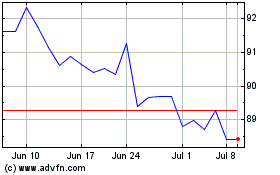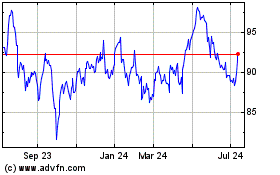By Kate King
NEW ROCHELLE, N.Y. -- Plastics manufacturer Richard Ellenbogen
has found a way to keep the lights on: He makes his own
electricity.
Mr. Ellenbogen's business, Allied Converters, has been making
plastic packaging here since his father started the company in
1954. The factory makes between 4 million and 5 million pounds a
year of plastic packaging, such as cookie wrappers and sandwich
wrapping for the food industry.
An electrical engineer concerned about climate change, Mr.
Ellenbogen started renovating his building nearly 20 years ago with
the goal of reducing its environmental impact. As a result, he
saves electricity and money at a time when the broader business
community in Westchester County is sounding the alarm over what
some say is an impending natural-gas shortage.
"Basically, our energy usage over 20 years has gone down, while
everybody else's has gone up," he said. "That's how we're able to
stay here."
Consolidated Edison Inc., which delivers gas via 4,300 miles of
pipes to 1.1 million customers including most of Westchester
County, stopped accepting new applications for natural-gas hookups
in March, claiming existing demand has stretched the limits of its
transmission pipeline. Energy supply to the county is also being
squeezed by the impending shutdown of the nearby nuclear power
plant, Indian Point Energy Center, which is expected to go offline
by April 2021 at the latest.
Con Ed's moratorium sparked an outcry among local elected
officials and business leaders, who warn developers won't want to
build in Westchester if they can't hook up to natural gas, which is
cheaper and considered more environmentally friendly than oil.
Business advocates, in particular, are pushing the state to allow
for the building of new pipeline, a move opposed by
environmentalists who fear it will deepen the state's dependency on
fossil fuels and pollute the state's waterways.
New York hasn't allowed new construction in years; the last
pipeline built in Con Ed's service area was completed in lower
Manhattan in 2013. Gov. Andrew Cuomo, a Democrat whose
administration has repeatedly blocked pipeline applications for
environmental reasons, in July signed a bill that committed the
state to reducing its greenhouse-gas emissions by at least 85% by
2050.
Mr. Ellenbogen acknowledged that many wouldn't consider plastic
manufacturing to be environmentally friendly. But he said his
business is making a universally used product in the most
sustainable way possible.
"Being a closely held company that doesn't have to answer to
shareholders, I made a decision to take the long view," Mr.
Ellenbogen said. "We have to leave something for future generations
so that they can have a viable planet to live on."
When he renovated his building, Mr. Ellenbogen installed a
cogeneration system that makes electricity and heat with very
little thermal-energy loss. He now pays $39,000 a year for
electricity and natural gas for his 55,000-square-foot building,
which he said is about the same amount he spent on electricity two
decades ago, when his factory was about a quarter of the size.
He also installed solar panels, which allow him to sell about
$21,000 in solar renewable-energy credits a year. That, and the
proceeds from Allied Converters' recycling program, have reduced
the company's total waste-removal and energy costs to a net $6,000
a year, he said.
From a financial standpoint, the amount Mr. Ellenbogen saves on
energy expenses has made all the difference in high-cost
Westchester County, where the number of manufacturers fell to 561
in 2016 from 711 a decade earlier, according to the U.S.
Census.
John Ravitz, executive-vice president and chief operating
officer of the Business Council of Westchester, said more
businesses are embracing environmentalism as a way of lowering
energy costs. But he said the state needs reliable energy supplies
in the meantime.
"We're all in on renewables," he said. "But it's not going to
get us where we need to be if we don't expand the pipeline."
Con Ed says businesses can apply for natural-gas hookups if they
reach an "interruptible service" agreement with the utility to
switch to an alternate source, such as oil, when demand gets too
high. The utility also reached an agreement with the owners of
Tennessee Gas Pipeline, which services Westchester County, that if
approved by regulators would allow for the moratorium to be lifted
in 2023.
"We believe the steps we are taking will help us maintain safe,
reliable service as we transition to renewables," a ConEd spokesman
said.
Kimberly Ong, senior attorney at the Natural Resources Defense
Council, said New York can't slow down as it moves toward renewable
energy.
"If we're going to avoid climate change's worst impacts, we have
to switch to clean energy," she said. "We're going to be mandated
under law very quickly to make this clean-energy transition."
Mr. Ellenbogen says he's proof that businesses can reduce their
fossil-fuel dependency, but he doesn't think New York can avoid
building more pipeline. After running the numbers -- he is happy to
walk you through his chart-dense power point -- he said the state
doesn't have enough renewable energy infrastructure in place to
meet its greenhouse-gas reduction goals in the next 30 years.
"I don't disagree with what the environmentalists are trying to
do," Mr. Ellenbogen said. "I disagree with how they're trying to do
it."
Earlier this year, Mr. Cuomo directed the state Public Service
Commission to investigate whether the moratoriums imposed by Con Ed
and National Grid, which has restricted hookups in parts of
Brooklyn, Queens and Long Island, are truly necessary. That review
is ongoing, a spokesman for the commission said.
A National Grid spokeswoman said in an email that the utility
remains "committed to working with all parties to address these
critical supply constraint and customer connection issues."
With an energy shortage looming, cracks are beginning to show in
Democrats' resolve to block a new pipeline. Earlier this month, six
Democratic state senators from Long Island signed a letter to the
state Department of Environmental Conservation asking it to approve
a new pipeline "on an emergency basis" if an independent body deems
it necessary.
On Thursday, Mr. Cuomo appeared resigned to the fact that a
pipeline might be necessary.
"What are the alternatives that we actually have to the
pipeline?" Mr. Cuomo said in an interview with Long Island News
Radio. "None of the options are good, there will be controversy
about all of them, but at the same time we can't halt
development."
Write to Kate King at Kate.King@wsj.com
(END) Dow Jones Newswires
October 27, 2019 07:14 ET (11:14 GMT)
Copyright (c) 2019 Dow Jones & Company, Inc.
Consolidated Edison (NYSE:ED)
Historical Stock Chart
From Mar 2024 to Apr 2024

Consolidated Edison (NYSE:ED)
Historical Stock Chart
From Apr 2023 to Apr 2024
